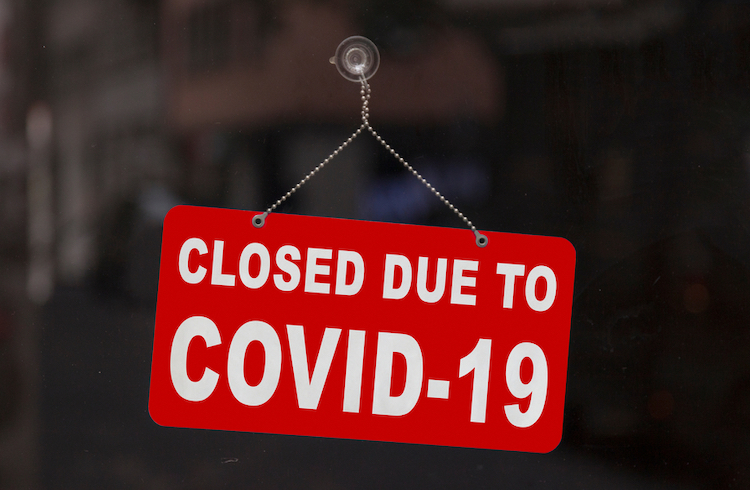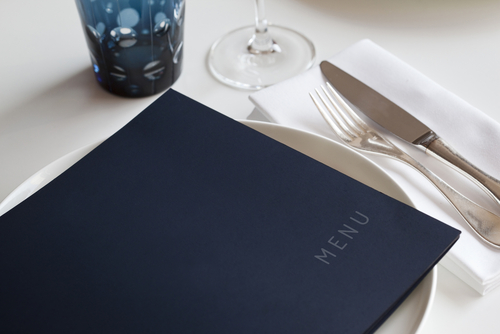Coronavirus pandemic prompts wave of ‘business interruption’ lawsuits by restaurants

Image from Shutterstock.com.
Erik Baylis loves the bar and restaurant life. He started as an hourly employee working in a bar and now owns Big Onion Hospitality, a Chicago company with seven local restaurants and bars and one in Nashville.
It’s thrilling to create your own business, Baylis says, and it’s satisfying to see customers walk away happy, whether they’ve eaten a burger or celebrated at a wedding reception.
“We do it because we love people,” he says. “All the smiles you’ve created. That’s why we do it.”
To ensure he’d keep making that magic happen no matter what, Baylis invested in substantial insurance coverage for his businesses, including purchasing “business interruption” coverage in case something beyond his control forced a shutdown of his operations.
In mid-March, such an event happened: the coronavirus pandemic. Like every other eatery in Illinois, Baylis’ businesses in Chicago were forced to close to the public when Gov. J.B. Pritzker closed bars and restaurants and days later issued a “shelter-in-place” order aimed at slowing the spread of the coronavirus that causes COVID-19 disease.
Baylis was at the mercy of both the coronavirus and government leaders. But he says he took comfort in knowing his insurance would help him pay the bills and his employees.
That’s why he was shocked when his insurer, Society Insurance Inc., of Fond du Lac, Wisconsin, denied his claim, seemingly without a full investigation.
“It’s dumbfounding,” he says. “Isn’t that what they’re for?”
Baylis’ Big Onion group has joined 13 other owners of eateries and movie theaters in the Chicago area in a federal lawsuit against Society Insurance, filed in March in the U.S. District Court for the Northern District of Illinois—part of a national wave of litigation arising from the coronavirus pandemic.
The suit says the businesses in the Big Onion case expect to lose more than $10 million before the statewide shutdown ends. They are seeking a declaratory judgment that would speed payment of their insurance claims, as well as damages for breach of contract and bad faith in claims handling.
Viruses or viral pandemics are not mentioned in the disputed policies as being excluded from coverage, so the Big Onion lawyers argue they should be covered under the “all-risk” policies. They say each insurance company determines the language of its policies, and if they didn’t want to pay out for a pandemic, they should have written that in.
The insurance industry says that’s absurd and would bankrupt insurers.
A spokeswoman for Society Insurance said the company does not comment on pending litigation but added, “We look forward to a favorable resolution of this situation in the near future.”
An industry group, the American Property Casualty Insurance Association, says if such lawsuits prevail, they will gut the entire insurance market. “Pandemic outbreaks are uninsured because they are uninsurable,” the organization says.
“Commercial and business interruption policies are not underwritten to include the risk of viruses, reinsurance is not purchased to cover viruses, and premiums are not calculated or collected to include viruses,” the APCIA said in a statement.
Although the policies in most restaurant lawsuits were silent on viruses, some other business interruption policies do have viral exclusions.
Key to the legal defense for insurers is the argument that a virus doesn’t constitute physical damage the way a fire, windstorm or ruptured gas line would. And because the statewide shutdowns don’t target a specific business, they don’t trigger policy coverage for “civil disturbances” that prohibit access to a business.
But Chicago attorney David Goodman of the Goodman Law Group, who specializes in insurance coverage disputes, says the physical damage argument doesn’t hold up. Microscopic virus particles widely disperse, which is a type of physical damage and is precisely why most of the country sheltered in place.
 Image from Shutterstock.com.
Image from Shutterstock.com.
“The virus, unfortunately, is everywhere, and it’s not visible,” Goodman says.
Chicago attorney Adam Levitt, a partner at DiCello Levitt Gutzler, and Houston attorney W. Mark Lanier, founder of the Lanier Law Firm, are teaming up on several similar federal lawsuits alleging breach of contract by various property insurers.
The small business plaintiffs in their cases, which seek class action status, include a bar and grill in Port Angeles, Washington; a bakery/café in Madison, Wisconsin; and a small pizzeria chain with locations in Coral Springs and Boca Raton, Florida. The attorneys have filed a motion seeking to have all the suits transferred to the Northern District of Illinois so they can be heard by a single judge.
Like the Big Onion lawsuit, Levitt and Lanier’s filings argue that the presence of a harmful virus does constitute actual property damage for their clients. They say their clients’ policies were meant to be “all-risk” policies in which anything that is not covered is expressly noted—and viral pandemics were not listed as an exclusion.
Moreover, the government shutdowns, the attorneys contend, are exactly the type of action that should trigger the policies’ “civil authority” coverage, which pledges help for business losses when a government authority stops a business owner from accessing their business property.
“They went out and bought these insurance policies for a specific reason,” Levitt says. The insurers “are going to have to step up and do the right thing.”
“The reason restaurant owners and others take out business interruption insurance is because they have a business that is sensitive to interruption,” adds Lanier, noting the tight profit margins of most restaurants. “You take out insurance when it’s going to be a huge deal when something happens.”
Another federal lawsuit, filed in U.S. District Court in Miami by the law firms Podhurst Orseck and Boies Schiller Flexner on behalf of Cafe International Holding Company, makes similar arguments in seeking to force a subsidiary of Chubb Ltd. to pay a business interruption claim by the owner of an Italian restaurant in Fort Lauderdale, Florida.
That suit seeks class action status so it can later add other plaintiffs who were insured by Chubb companies. Chubb is the world’s largest publicly traded property and casualty insurer.
The APCIA says paying restaurants’ coronavirus claims would create severe downstream effects for all Americans who use insurance because the losses the insurers would incur would have to be made up by other policyholders.
The industry group estimates small businesses with 100 or fewer employees already are losing somewhere between $255 billion and $431 billion per month due to closures. Those losses dwarf the $6 billion in premiums paid per month by businesses to insure commercial property, the APCIA says.
It adds that the total surplus for all the U.S. home, auto and business insurers combined to pay for future losses is about $800 billion, with business insurance underwriters accounting for “only a fraction of that amount.” Having to pay business interruption claims for a pandemic is far beyond what the industry could muster and would cause chaos across all lines of insurance, the group says.
“Spring flooding season is underway and hurricane season is around the corner. The people who rely on insurers to keep their everyday promises made in existing insurance policies should not be put at risk” because some customers are asking for uninsurable claims to be paid, the group said in a statement.
But the Big Onion lawsuit also alleges their insurer acted in bad faith, issuing quick blanket denials without really investigating each customer’s situation. The suit cites a March 16 email from Society Insurance President and CEO Rick Parks to the company’s “agency partners” in which he lays out all the reasons why Society “likely” won’t cover business interruption losses.
Law professor Anat Alon-Beck of Case Western Reserve University in Cleveland, an expert in contracts and corporate law, says she’s not surprised by the preemptive denials.
“The first thing they do is deny, before you even talk to them,” Alon-Beck says. “It’s not uncommon. It’s the first thing they do and it’s the first thing they advise their clients to do.”
Legislation has been proposed in a handful of states that would require insurers to cover business interruption losses related to the coronavirus pandemic. Similar ideas are being floated in Congress.
The draft Pandemic Risk Insurance Act would require insurers to cover business losses due to a pandemic, with the federal government serving as a backstop if their payouts exceed $250 million. There is some precedent in the Terrorism Risk Insurance Act, passed after 9/11, though it’s noteworthy that the coronavirus has affected businesses across the entire country in a way that terrorism has not.
The National Association of Insurance Commissioners is urging caution about forcing insurers to pay, warning in a March 25 statement that mandating these claims be paid “would create substantial solvency risks for the sector, significantly undermine the ability of insurers to pay other types of claims, and potentially exacerbate the negative financial and economic impacts the country is currently experiencing.”
The industry association argues that it’s unconstitutional for government to impair private contracts. “We strongly oppose any proposals that retroactively rewrite insurance contracts and threaten the stability of the sector, to the detriment of all policyholders,” it said in a statement.
The insurance industry is publicly advocating for Congress to do more to help small businesses with direct financial assistance.
After the pandemic ends, Goodman expects to see more insurance companies tighten their exclusions—and offer special pandemic insurance at a higher price.
He says the coronavirus shows why it’s important to have a skilled attorney who can review policy coverage and recommend action. Many small business owners, upon getting a denial letter, simply give up.
“The claimant goes away, so that’s a very effective way of avoiding claims,” Goodman says. “That’s why you really need to work with someone who really understands your coverage and the risk.”



